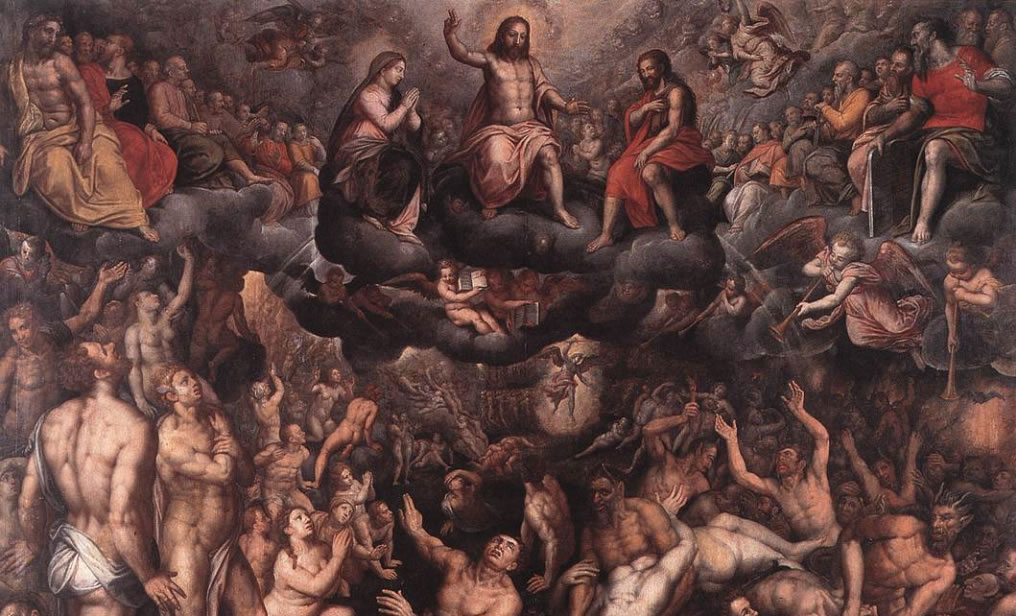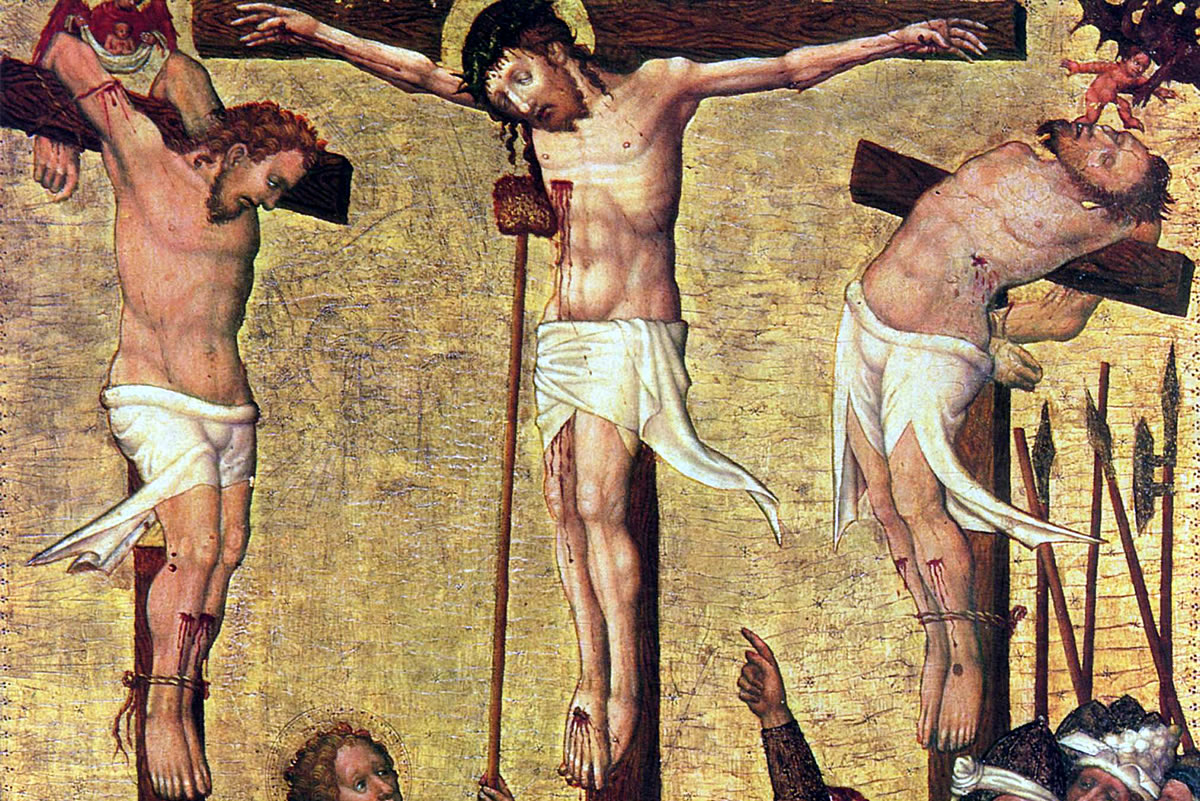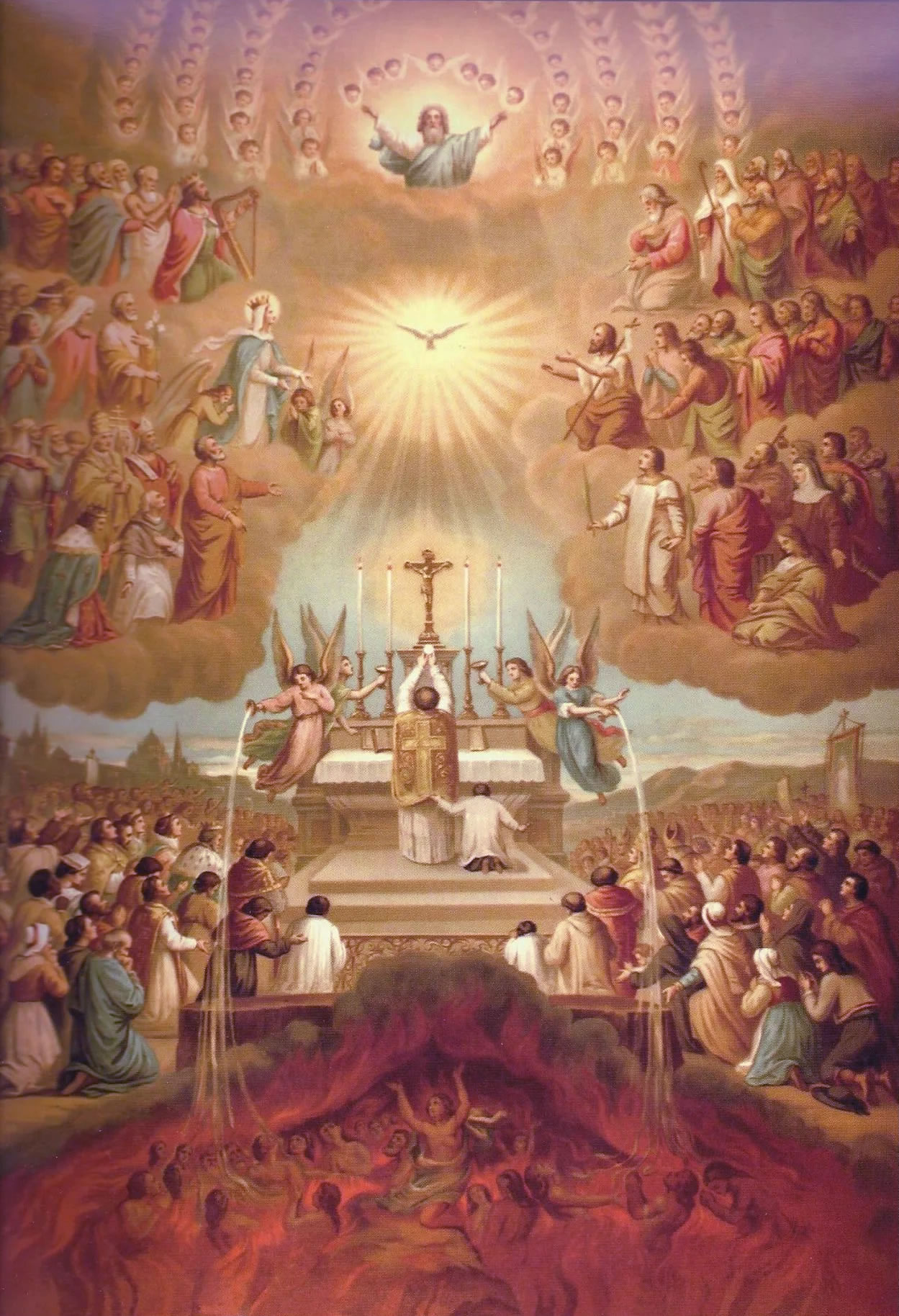Church Teaching on Indulgences
The Catechism’s complete definition of an indulgence is:
a remission before God of the temporal punishments due to sins whose guilt has already been forgiven, which the faithful Christian who is duly disposed, gains under certain prescribed conditions through the action of the Church, which, as the minister of redemption, dispenses and applies with authority the treasury of the satisfactions of Christ and the saints.
This means:
- it removes or reduces temporal punishments;
- to gain it, one must be a faithful Christian who is duly disposed;
- one gains under certain conditions or by doing prescribed actions;
- it is dispensed by the authority of the Church from the Treasury of Satisfactions.
We will unpack each of these on this page.
Guilt and Restitution
Why we need to suffer for our sins
Two things happen when we commit a crime. First is we become guilty, and second, we incur a civil liablility. To fix this, we also need two things: need to be pardoned for our guilt, and we have to make up for the civil liability. For example, a friend steals money from you. She feels guilty, confesses the crime to you, and asks forgiveness from you. Even if you forgive her, she still has to give back the amount she took from you because justice warrants it. It is called restitution.
It is the same in the spiritual life. When we sin, we become guilty in the eyes of God because it is him whom we disobey. We also need to make make up for the sins we commited. So, even if he forgives us in the Sacrament of Reconciliation, we still have to make some form of restitution in the form of temporal punishment1. In the spiritual life, we call this satisfaction – and in confession, the priest starts off this process by asking us to do some penance.
In the Old Testament, King David slept with Bathsheba even if she was married to Uriah who was away in battle. When she told David that she was pregnant, he wanted to cover it up, and had Uriah sent to the battle front where the fighting was most fierce – eventually killing him. The prophet Nathan made it known to David that this was evil in God’s eyes…

Then David said to Nathan, “I have sinned against the LORD.” Nathan answered David: “For his part, the LORD has removed your sin. You shall not die but since you have utterly spurned the LORD by this deed, the child born to you will surely die.”
In this anecdote, even if God had forgiven David, he had to endure some temporal punishment through the death of his son. In this, we should understand that forgiveness and satisfaction are two different things. Therefore, each time we sin, we have to make satisfaction for them to God.
Purgatory
Where purgatory fits in the idea of salvation

Where does Purgatory fit in the process of salvation? Temporal punishment, if we cooperate with it, realigns ourselves with God by turning our vices into virtues. It also allows us the possibility of making satisfaction for all our sins. It would be ideal if we can make satisfaction for all our sins before we die.
However, it is probable that we might die in a state of grace but still have not fully made full satisfaction for all our transgressions. In a sense, there are still appendages of our offenses in the form of unfulfilled satisfaction that soil us. Since nothing unclean can enter heaven2, we must first go through a “cleaning house” which we call purgatory. In such a case, the end destination of heaven is already certain for we have died in God’s friendship, but we must still make full satisfaction before entering his presence. 3
Disposition
Who can gain indulgences
Must be baptized
One must have a valid baptism to gain an indulgence.4 A valid baptism uses the words, “I baptize you in the Name of the Father, and of the Son, and of the Holy Spirit.”
Since the Catechism uses the word Christian and not specifically Catholic, other baptized Christians can access indulgences since baptism, regardless of who performs the baptism, is the normal way to enter into the Church.
Protestant Christians, however, might have difficulty obtaining Plenary Indulgences because it requires Sacramental Confession, Communion which are inherently Catholic and Eastern Orthodox.
In Communion with the Church
(not excommunicated)
One must be not excommunicated.5 When correction is necessary, the Church may decree a person excommunicated, and therefore not able to participate in its services. In this case, an excommunicated person cannot partake in the services and concessions of the Church – one of which are indulgences.
In a state of grace
When the catechism says indulgence is, “a remission before God of the temporal punishments due to sins whose guilt has already been forgiven,” it means an indulgence can be earned only when in a state of grace (at least before the completion of the prescribed works). 6 Another way of saying this is that we must not be in a state of mortal sin. If we have mortal sin, we need to remedy this through confession first.
The reason for this is that God gave us everything; he owes us nothing.7 The only way we can merit anything is if we are connected to him through sanctifying grace because it allows us to share his divine nature. In this state of grace, because we are sharing his divine nature, our actions have an eternal value deserving of an eternal God. In a sense, when we are in a state of grace, we lend our body to God so he can do his work through us.8 In this sense, when we work for indulgences, it is God continuing his work of salvation through us. What a wonderful thought that we are co-workers in his vineyard.9 But if we are separated from God because of mortal sin, he can’t work through us for we have set him aside.
Intends to gain the indulgence
One must have an intention of gaining an indulgence.10 This means even if an indulgence is attached to an act or prayer, one doesn’t gain it accidentally if he or she doesn’t know of it, or does not intend it.
Full & Partial
Types of indulgences
Plenary Indulgences
A plenary indulgence removes of all temporal punishment due to sins. When one receives a plenary indulgence, his or her soul becomes like that of one of who is newly baptized.
The Church prescribes the conditions or actions when one can gain a plenary indulgence. It is normally accompanied by Three Constants namely: Sacramental Confession, Eucharistic Communion, and Prayer for the Pope's intentions.
A condition can be a state of being. For example, when one is at the moment of death, the Church grants a plenary indulgence if the person wants it. An action can be something like reading Sacred Scriptures for thirty minutes, or in the Year of Mercy (8 Dec 2015 to 20 Nov 2016) Pope Francis granted a plenary indulgence to those who walk through Sacred Doors of selected churches around the world.
Generally, one can gain only one indulgence a day, that is except on one's moment of death when he or she can earn a plenary indulgence even if one was already gained earlier in the day.
Check how to gain a plenary indulgence, which includes conditions and prescribed actions listed from the 4th Edition of the Manual of Indulgences.
Partial Indulgences
A partial indulgence removes some of the temporal punishment due to sins. One can earn as many indulgences as they work for.
Generally, the conditions to gain a partial indulgence is less than for a plenary indulgence. An example of this can be simply saying a short prayer of trust while enduring everyday hardships.
Check how to gain a partial indulgence, which includes conditions and prescribed actions listed from the 4th Edition of the Manual of Indulgences.
Dispensed by the Church
The Authority of the Church to dispense from the Treasury of Merits
How do we know temporal suffering can be commuted?
At the crucifixion there was a curious exchange between Christ and one of the thieves:
Now one of the criminals hanging there reviled Jesus, saying, “Are you not the Messiah? Save yourself and us.”
The other, however, rebuking him, said in reply, “Have you no fear of God, for you are subject to the same condemnation?
And indeed, we have been condemned justly, for the sentence we received corresponds to our crimes, but this man has done nothing criminal.”
Then he said, “Jesus, remember me when you come into your kingdom.”
He replied to him, “Amen, I say to you, today you will be with me in Paradise.”
As thieves, they broke the seventh commandment, and whatever it was they did to deserve the capital punishment of crucifixion. As such, they needed to make satisfaction for these sins. The good thief, however, made an act of faith and Our Lord rewarded him with paradise on that same day. This meant the good thief no longer had to undergo temporal punishment — he was given a plenary indulgence!
God give's his Church, through the pope, the same authority to commute temporal punishment when she grants indulgences.

The Church's authority and source of indulgences
Indulgences are obtained through the Church that Christ gave the power, through the Pope, to “loose and bind.” 11
It isn’t magical as if indulgences come from nothing; on the contrary, they are taken from the satisfactions merited from Christ’s Passion as well as the good works and prayer of Mary and the saints.12

We can think of it this way: some people merit satisfactions more than they need, and the surplus is pooled together in a treasury of merits.13 And since Christ is the prime source of this, it is limitless for he is limitless.14 The Church, through its authority, dispenses these as indulgences. Corollary to that, the Church, through the same authority, prescribes the works needed to gain these indulgences.
Suffrage
Applying indulgences to others
One of the things we say in the creed each Sunday is we that we believe in the Communion of Saints. This means we believe that the Church of Christ currently exists in three states. The first is the Church Triumphant that consists of those in heaven. The second is the Church Militant that is composed of the living who fight sin and evil. The third and last is the Church Suffering who are those in purgatory being purified.

The important aspect of this doctrine is that all three states make up Christ’s Mystical Body. Just like a body, the wellness or sickness of one part affects the others. Likewise, a perennial link of charity exists between the different states of the Church.15 This means the holiness of one profits others.16
Therefore, those of us who are alive can work for an indulgence and apply it to those in purgatory.17 We don’t apply it for those in heaven for they no longer have need of it.
The living cannot apply indulgences to other living persons for they can work for these indulgences themselves.18 Sadly we do not offer indulgences for those in hell for that is already their eternal destiny and no amount of sacrifices or indulgences can change that. They have made their choice to be there and God respects it.
The notion of praying for the dead is evident even before the era of the Church. We look at the story of the Maccabees, who made expiations for the sins of the dead.
In so doing this he acted in a very excellent and noble way, inasmuch as he had the resurrection in mind; for if he were not expecting the fallen to rise again, it would have been superfluous and foolish to pray for the dead. But if he did this with a view to the splendid reward that awaits those who had gone to rest in godliness, it was a holy and pious thought. Thus he made atonement for the dead that they might be absolved from their sin.”
From this we understand that praying for the dead is effective and it isn’t something that was introduced by Judas Maccabees if it had not always been their custom.19 Catholics continue this practice when we offer masses for the dead, and when we earn indulgences and apply them to those in purgatory.
Since God knows our heart, there is no special ritual or prayer needed to apply indulgences we’ve earned to our departed beloved. The mere intention of gaining an indulgence for a departed one is enough and God knows what to do with it. Of course, saying a prayer and articulating this intention is good too.
To learn more about indulgences, read the Catechism of the Catholic Church § 1471 – 1479
Footnotes
- Catechism of the Catholic Church (CCC) § 1472
- Revelation 21:27
- CCC § 1030
- Manual of Indulgences. 4th Edition. Norm 17.1
- Ibid.
- Ibid.
- CCCC § 2007
- CCC § 2008
- Matthew 20:1-16, 21:33
- Manual of Indulgences. 4th Edition. Norm 17.2
- Matthew 16:19, CCC 1478. Manual of Indulgences. 4th Edition. Norm 1
- CCC § 1477
- Baltimore Cartechism § 854
- Indulgentiarum Doctrina. Chapter 2. § 5. “the infinite and inexhaustible value of the expiation and the merits of Christ Our Lord…”
- Indulgentiarum Doctrina, § 5.
- CCC § 1474-1475
- CCC § 1476,1479. Canon Law § 994. Manual of Indulgences 4th Edition. Norm 3.
- Manual of Indulgences. 4th Edition. Norm 3
- Footnotes from the Douay Rheims version

